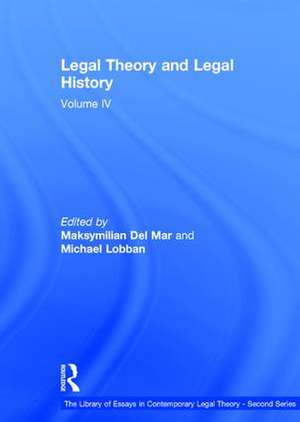Legal Theory and Legal History: Volume IV: The Library of Essays in Contemporary Legal Theory - Second Series
Autor Michael Lobban Editat de Maksymilian Del Maren Limba Engleză Hardback – 15 oct 2014
Preț: 1699.44 lei
Preț vechi: 2280.72 lei
-25% Nou
Puncte Express: 2549
Preț estimativ în valută:
325.23€ • 338.29$ • 268.49£
325.23€ • 338.29$ • 268.49£
Comandă specială
Livrare economică 24 martie-07 aprilie
Doresc să fiu notificat când acest titlu va fi disponibil:
Se trimite...
Preluare comenzi: 021 569.72.76
Specificații
ISBN-13: 9781409452218
ISBN-10: 1409452212
Pagini: 608
Dimensiuni: 174 x 246 x 45 mm
Greutate: 1.38 kg
Ediția:1
Editura: Taylor & Francis
Colecția Routledge
Seria The Library of Essays in Contemporary Legal Theory - Second Series
Locul publicării:Oxford, United Kingdom
ISBN-10: 1409452212
Pagini: 608
Dimensiuni: 174 x 246 x 45 mm
Greutate: 1.38 kg
Ediția:1
Editura: Taylor & Francis
Colecția Routledge
Seria The Library of Essays in Contemporary Legal Theory - Second Series
Locul publicării:Oxford, United Kingdom
Cuprins
Contents: Introduction. Part I Challenging the Thought of the Present: The common law and legal theory, A.W.B. Simpson; Why is Anglo-American jurisprudence unhistorical?; Morton J. Horwitz; Classification of private law in relation to historical evidence: description, prescription, and conceptual analysis, Stephen Waddams; Interpretive legal theory and the academic lawyer, Allan Beever and Charles Rickett. Part II Reconstructing the Thought of the Past: What is legal history a history of?, David Ibbetson; Reason in the development of the common law, S.F.C. Milsom; Common law reasoning and the foundations of modern private law, Michael Lobban; The common-law status of colonies and Aboriginal ’rights’: how lawyers and historians treat the past, P.G. McHugh; Reflections on ’doing’ legal history, John Baker. Part III The Promise of History for Jurisprudence: Toward an integrative jurisprudence: politics, morality, history, Harold J. Berman; Historical jurisprudence, Geoffrey MacCormack; The tasks of historical jurisprudence, Peter Stein; Science, law and history: historical jurisprudence and modern legal theory, Geoffrey Samuel; Critical legal histories, Robert W. Gordon; After critical legal history: scope, scale, structure, Christopher Tomlins. Part IV Socio-Historical Jurisprudence: Introduction: J. Willard Hurst and the common law tradition in American legal historiography, Robert W. Gordon; Theory and practice in law and history: a prologue to the study of the relationship between law and economy from a socio-historical perspective, David Sugarman; Pigs and positivism, Hendrik Hartog; Law ’in’ and ’as’ history: the common law in the American polity, 1790-1900, Kunal M. Parker; How autonomous is law?, Christopher Tomlins. Name index.
Notă biografică
Maksymilian Del Mar is Reader in Legal Theory at Queen Mary University of London, UK and Michael Lobban is Professor of Legal History at the London School of Economics, UK.
Descriere
The papers selected for this volume explore issues in the study of historical jurisprudence. The topics range from the challenge to legal positivism from the perspective of the history of the common law, to the latest methodological debates in socio-historical jurisprudence. Taken together, these papers show historical jurisprudence to be a creative discipline capable of yielding insights about how to conceptualise legal change, how to give voice to those operating outside of legal officialdom and how to understand the relationship between law and politics.


